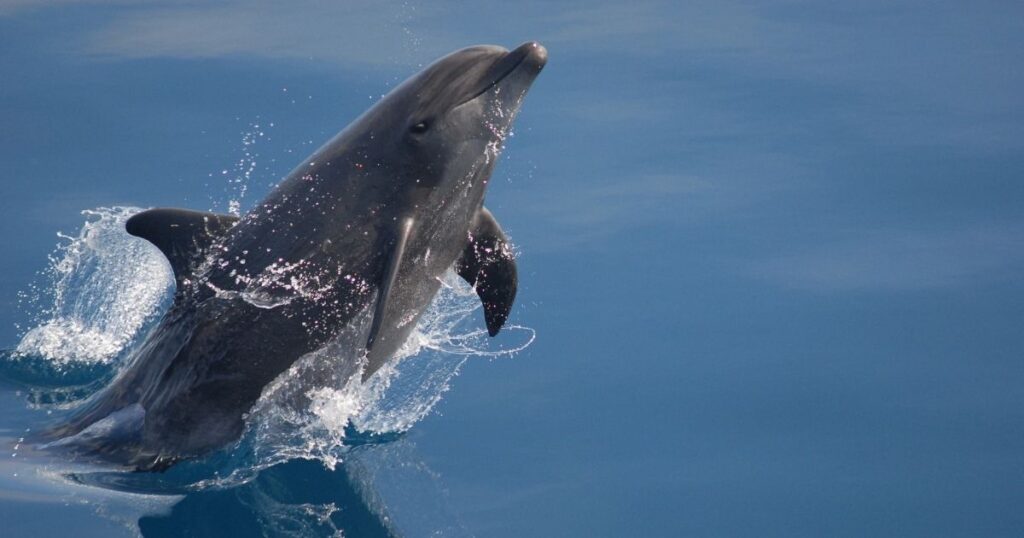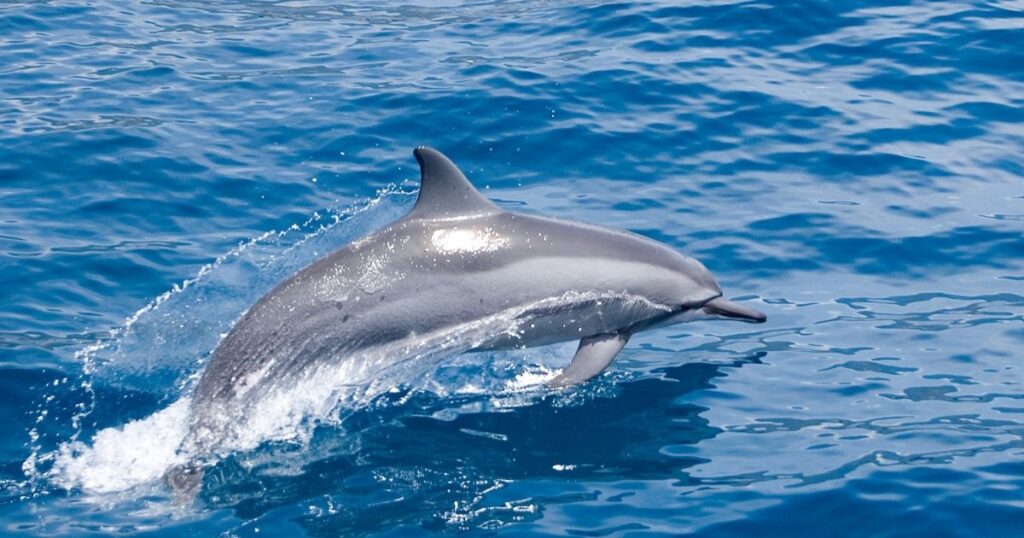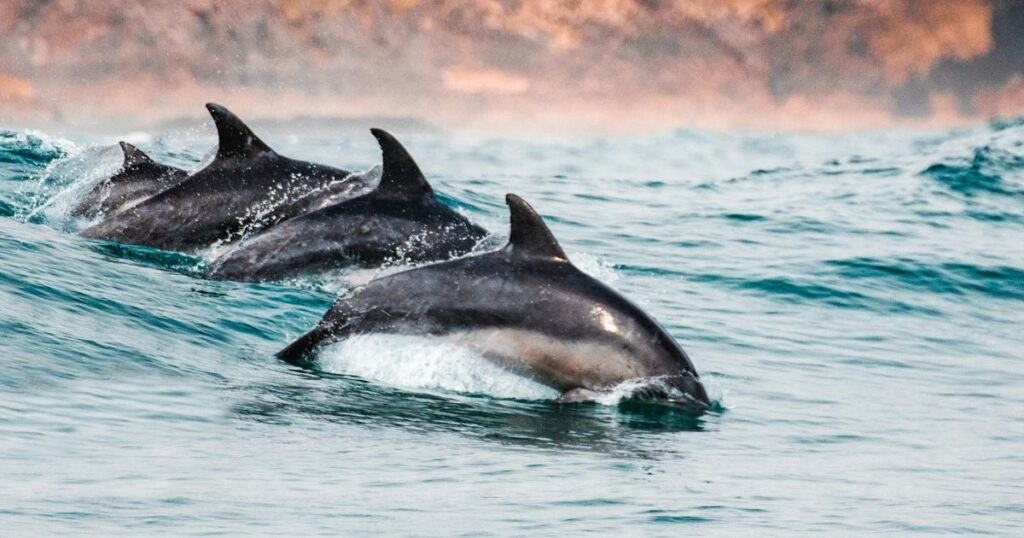Last updated on July 1st, 2024 at 12:13 pm

Are Dolphins Cold-Blooded? No, dolphins are not cold-blooded; they are warm-blooded mammals, meaning they can regulate their body temperature internally.
In general, people tend to think of dolphins, graceful and intelligent mammals of the sea, as cold-blooded animals.
On the other hand, the situation is not as it is shown. In this article, you will learn the real truth about dolphins while the myth about dolphins’ origin is debunked.
Table of Contents
Understanding Cold-Blooded vs.Warm-Blooded
Being an ectotherm or an endotherm characterizes two different classes of animals in the animal world with absolutely distinct modes for thermoregulation.
Cold-Blooded Animals (Ectotherms):
Definition: The ones that are cold-blooded, like reptiles, amphibians, and fish, are simply exposed to the heat from the environment to maintain their body temperature.
Thermoregulation: They can either warm up by remaining in the sun bask in the heat or look for warmer places to be. And their body temperature also goes up and down with the environment.
Metabolism: Unlike mammals and birds, which require energy to maintain their core temperatures, reptiles and amphibians are poikilothermic, and as a result they have lower metabolisms.
Examples: Snakes, lizards, tortoises, frogs, and fish.
Warm-Blooded Animals (Endotherms):
Definition: These animals, of the warm-blooded type, that is, mammals and birds, are capable of self-regulating their body temperature internally without depending on the temperature outside.
Thermoregulation: They regulate body temperature at a stable level by means of physiological mechanisms that either produce heat or cooling, such as shivering and sweating.
Metabolism: Since warm-blooded organisms have higher metabolic rates compared to cold-blooded animals, they are continuously producing heat to carry on the internal temperature of the organisms.
Examples: Dolphins, whales, humans, birds, and the majority of mammals.
Comparison Table:
| Aspect | Cold-Blooded Animals | Warm-Blooded Animals |
| Thermoregulation | Rely on external heat sources | Internally generate and regulate heat |
| Metabolic Rate | Lower metabolic rate | Higher metabolic rate |
| Body Temperature | Fluctuates with external environment | Maintains a relatively constant temperature |
| Examples | Reptiles, amphibians, most fish | Mammals, birds, dolphins, whales |
Knowing how different animals (cold-blooded and warm-blooded) utilize different strategies to adapt to and survive in their environment will give us a glimpse of nature’s diversity.
Moreover, it gives the idea of complex systems that organisms employ to maintain optimal physiological function.
Whereas cold-blooded creatures rely on the heat from the environment to regulate their body temperature, warm-blooded creatures have evolved mechanisms inside their bodies.
They generate and maintain body warmth allowing them to live in many of the habitats with diverse climates.

Debunking the Myth: Are Dolphins Cold-Blooded?
Surprisingly, dolphins are not cold-blooded organisms as commonly assumed. Actually, they are living in a warm-blooded society along with humans and other mammals.
This categorization is due to their ability to body temperature regulation internally, which is a characteristic that is of high essential for marine life since the marine environments they inhabit are diverse and often unpredictable.
Reasons Why Dolphins Are Not Cold-Blooded
Warm-blooded Physiology:
Dolphins, as well as other mammal species, are one of the examples of endothermic animals, the scientific term for warm-blooded animals.
This means they do not only keep their body temperature constant within a narrow range but also regulate it from the inside. Unlike cold-blooded (ectothermic) animals, which have to rely on external sources of heat.
Efficient Metabolism: Are Dolphins Cold-Blooded?
The dolphins have an effective metabolism that is able to keep the body heat of the dolphins at an optimum level by generating and retaining heat inside the body.
While they do not have the adjustment mechanism of warm-blooded animals, they still have a higher metabolic rate that reflects continuous energy expenditure to keep their body temperature.
Temperature Regulation Mechanisms:
Dolphins have developed sophisticated physiological tools for temperature regulation, which they constantly use.
Such responses include either vasoconstriction or vasodilation to conserve or dissipate heat, while behavioral adaptations such as basking in the sunlight and going to the deeper waters with warmer temperatures are also used to regulate the temperature of their bodies.
Insulating Adaptations:
They have a thicker layer of blubber under their skin that works as an insulator from freezing conditions. They store the heat within this layer of blubber and their body temperature remains stable even in the cold waters of the ocean.
Warm-blooded Classification:
Scientific classifying emphasizes that dolphins are also warm-blooded mammals. This is the same group as humans and other endothermic animals. [Are Dolphins Cold-Blooded?]
This classification occurs due to their physiological features and the capability of maintaining a proper internal environment without the help of their environment.

Importance of Temperature Regulation in Dolphins:
Survival in Diverse Environments:
Temperature regulation is crucial for dolphins’ success in ocean environments that may vary widely.
Either in the warm waters of tropical seas or in the cold waters of polar regions, dolphins are required to keep a balance in body temperature for them to be comfortable with their environment.
Optimal Physiological Function:
This is important for dolphins because it helps them regulate their body temperature and maintain their peak physiological performance.
Maintaining a consistent internal temperature is fundamental for metabolic processes, which includes the efficiency of enzyme activity, nutrient absorption, and waste removal.
They do that by regulating their body temperature in a very narrow range so that there are no complications in the processes that are essential for their survival. [Are Dolphins Cold-Blooded?]
Metabolism and Digestion:
Temperature regulation is an essential task for not only dolphins’ metabolic rate and digestion but also for many other physiological processes.
A stable body temperature is an important condition that directly affects the way metabolic rates work and that guarantees the production of energy and its utilization.
Further, digestive processes are also facilitated by holding the right temperature level that allows for the breakdown and absorption of their diet rich in fish, squid, and other ocean prey.
Muscle Activity and Performance:
The muscle activity and performance of dolphins are affected by temperature management. Body temperature that is optimal helps the muscles to be efficient and flexible and this leads to swimming at top speed and agility.
This is essential for predatory animals to catch their prey and predators to avoid them, and it is also important for social things like mating or playing for them. [Are Dolphins Cold-Blooded?]
Adaptability to Environmental Changes:
Dolphins’ ability to control their body temperature means that they can survive in various kinds of water, especially in the case when the environment rapidly changes.
They will change their physiological reactions to variations in water temperature, which helps them to endure in diverse marine habitats.
Such adaptability gives dolphins a unique ability to migrate through great distances and occupy many different kinds of habitats where they are naturally found.
Behavior and Social Interactions:
Besides that, temperature regulation has a direct influence on the dolphins’ behavior and social relationships. [Are Dolphins Cold-Blooded?]
Being able to keep a stable internal temperature, permits dolphins to have a wide variety of behaviors such as hunting, socializing, and communicating with other members of their pod.
The plasticity of their bodies allows them to maneuver with the ocean currents, and to interface with their environment in an accurate manner.

FAQs: Are Dolphins Cold-Blooded?
How Do Dolphins Not Get Cold?
Dolphins have the thickest skin blubber in the animal kingdom of all mammals which is their insulator that helps them keep heat in the cold water. Furthermore, their body design permits them to keep their body temperature constant internally, irrespective of the outside temperature that goes up and down.
Are Whales Cold-Blooded?
No, whales are not cold-blooded creatures like dolphins, but they are warm-blooded animals like humans. As they belong to the class of mammals, they are good at maintaining their body heat within themselves. This adaptation enables them to be active in various marine ranges, such as polar and tropical.
Can Dolphins Get A Cold?
However, dolphins may suffer from respiratory infections and other illnesses but they cannot be infected with the common cold as humans do. However, they are especially vulnerable to diseases and infections, especially in contaminated or polluted waters.
Are Dolphins Homeothermic?
It is true that dolphins fall into the category of homeothermic animals which means that they can keep the body temperature steady in spite of the surrounding temperature. It is this ability that prevents their death in the marine environment, helping to keep their metabolic processes in check, and allowing them to be active and healthy in disparate oceanic habitats.
Conclusion: Are Dolphins Cold-Blooded?
To sum up, the concept that dolphins are cold-blooded and therefore slow and lethargic is nothing but a myth.
These amazing marine mammals are warm-blooded vertebrates, with their special physiological adaptations enabling them to survive and thrive in the vivid and sometimes aggressive conditions of the ocean.
In realizing the same warm-blooded feature common to dolphins, we show admiration and appreciation for their uniqueness and complexity as living creatures.
Therefore, the next time you meet a dolphin, note this—they’re not cold-blooded creatures, but they’re just as warm as they are warm-blooded.

Mr. Das, a certified pharmaceutical scientist, holds a Bachelor of Science in Pharmaceutical Sciences and passionately contributes to dolphin conservation as a member of the committee in Bangladesh.


